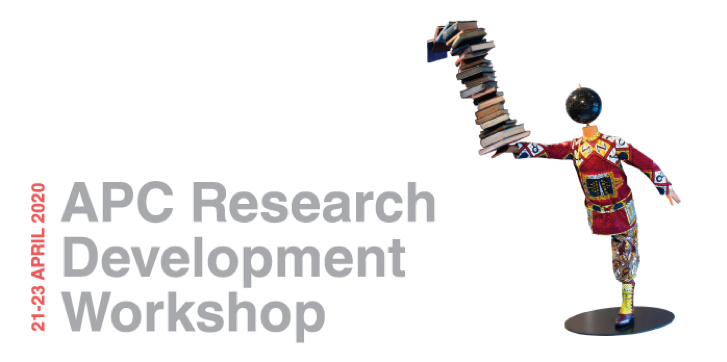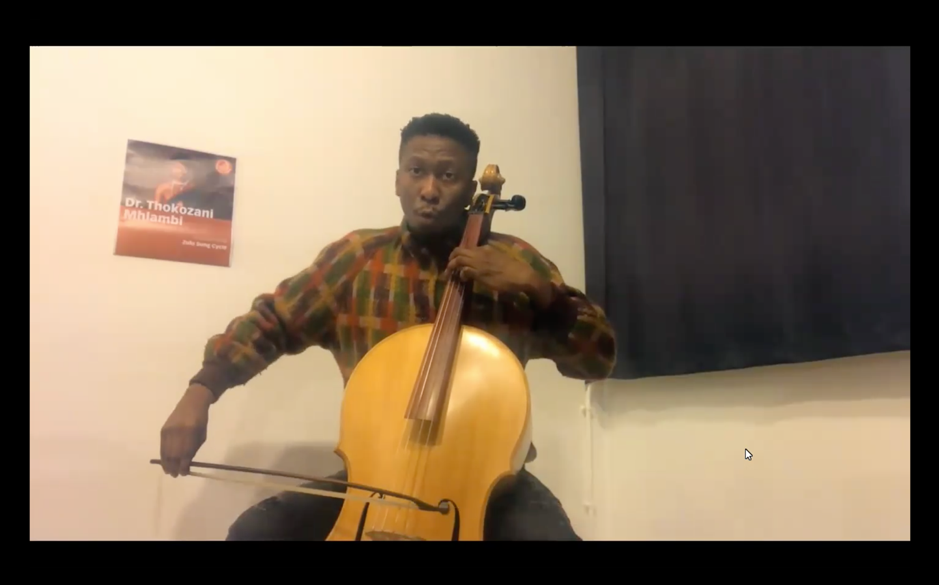APC Research Development Workshop Report – April 2020

The APC’s first Research Development Workshop of 2020 was undertaken in the midst of the global COVID-19 pandemic and lockdown conditions, as universities in South Africa and many countries worldwide navigated closed campuses and the challenges of online teaching and research. At the APC, we felt that in this moment of great uncertainty, exacerbated inequalities and generalised malaise, the workshop could invigorate and motivate the research endeavours of our students and research affiliates.

The APC Research Development Workshop graphics drew inspiration from Yinka Shonibari's Tradewinds installation,and Valentin Mudimbe's (1988) critique of the colonial library.
The workshop was held from 21-23 April 2020 through the online meeting platform Zoom.
The online format facilitated access to the workshop for associate researchers from other places who would normally find it more difficult to join us. We had a record 31 participants, with contributors from elsewhere in South Africa, as well as Namibia, Italy, France, the UK and the USA.
To make the workshop online-friendly, we hosted ‘flash sessions,’ reducing the timeslots for each paper from the usual 45 to 30 minutes as well as introducing written comments from a respondent to each paper to serve as catalysts for discussion. Based on the feedback received, the workshop was a resounding success, intellectually stimulating and energising for all during these difficult times.
The first day began with a session concentrating on the vernacular ‘black press’ of the early 20th century, with papers from Sibusiso Nkomo and Precious Bikitsha. Questions of audience and the function of language and ‘concepts in motion’ shifting through time were stand-out points which would resonate throughout the workshop.
Session 2 consisted of a range of papers dealing with archives of more recent times which speak to the long past. In Cynthia Kros’ and Wade Smit’s papers questions of the networks of scholarship were salient, either when editing a multivolume collection on the “archives of times past” or when trying to grapple with a vast range of archaeological literature as a historian interested in vernacular historiography and concepts. Sanele Ntshingana’s paper highlighted the issue of tracing the change over time in concepts in the vernacular relating to issues of rule, while Ettore Morelli’s raised the idea of “travelling to go back in time,” bringing spatial and temporal dimensions together.
The last session of the day gathered papers on archives of music and sound, images and light, and poetry and performance. Thokozani Mhlambi’s outstanding paper excavated music from disciplinary relegation and brought forth the matter of ‘ethos’ as political force in the public sphere. Nessa Leibhammer explored light as a visual language that supports certain constructs, while Katleho Shoro presented practice as research of an ‘ephemeral’ archival repertoire.
We began day two with a session which brought together papers concentrating on the region of KwaZulu-Natal, both during colonial and more recent times. Daniel Dix’s paper highlighted the complex field in which governmentality was taking place in colonial Natal, while Sarah-Jo Bagg’s Honours Proposal examined the making of colonial discourses on witchcraft. MA student Angela Ferreira's proposed a study of the history of the communities of southern Natal labelled "Coloured" under apartheid, who now claim a Khoisan heritage, while Sizakele Gumede’s paper highlighted how to constitute a ‘biographical’ subject as a mode of historical writing, with regards to Harriette Colenso. Finally, Ayanda Mahlaba’s thesis chapter demonstrated that the ‘matriarchive’ is composed of multiple voices and offered insights into what it contributes to the history of a place like Mpolweni Mission.
Session five consisted of papers concentrating on ‘absences’ of different kinds, archival, aural and visual. Tracey Randle’s chapter on the “archive of irretrievable sound” beautifully analysed a project aimed at recreating the ‘lost’ musical legacies of the Cape, while Carine Zaayman’s concept of “imprints of absence” was illustrated in relation to gaps in the archives relating to Krotoa. Lastly, Joanne Bloch’s compilation of experiences of partially-sighted people, powerfully explored the multiple layers of the “unseen.”
The last session of the day focused on twentieth-century political history, seen through the Southern African lenses of apartheid espionage and Cold War paranoia, political and armed struggle in one of the sub-regional 'peripheries', and the long history of labour. Billy Keniston’s thesis chapter exemplified the personal and professional difficulties of working on a personal archive of a despicable figure. Patrick Whang highlighted the importance of understanding regional connections to mitigate the insularity of Lesotho in South African historiography. Finally, Camalita Naicker’s exhaustive review of South African labour historiography revealed the persistent patterns and categorisations of migrant workers, which constrain modes of analysis of their political activity.
The last day of the workshop began with a session on present-day archiving, curating and museum practices. Jess Auerbach’s curation of a pop-up “archive of kindness” during this most recent global crisis, raised questions about the ‘frenzy’ to archive and the consequences of the framing of ‘kindness,’ which might not take into account the perceptions of recipients of such acts. Michaela Clark’s chapter raised difficult questions concerning marooned photographic medical collections and what their contemporary and future uses might be, while Greer Valley’s description of the “Goede Hoop” exhibition in the Netherlands posed important questions of contemporary curating practices in the Global North.
Session 8 was neatly delineated with a concentration on the James Stuart archive at multiple levels. John Wright’s reflections on his ‘life’ with the James Stuart Archive powerfully illustrated the entanglement of the archive and the researcher, while Henry Fagan’s examination of the impact of this archive on South African historiography exemplified the co-production of archive, scholarly practice and academic publics. Carolyn Hamilton and Grant McNulty’s early draft of a paper, for a special edition of History in Africa on digital humanities and future archives, examined what digital affordances offer for the new methodological approaches to the archive pertinent to the eras immediately before European colonialism.
Lastly, the final session of the workshop assembled papers on themes of archive and curation more generally. Susana Molins Lliteras’ chapter on the multiple “authorising” of a particular archive in Timbuktu raised questions of ‘ideation’ from an African perspective. MPhil student Benathi Marufu proposed a study of the changing understandings of digital curation in three South African projects looking at the eras immediately before colonialism, contrasting them with the dominant digital curation discourse concerning the processing of data. Heather Hughes’ collaborative project on public history and contested heritage, in the creation of an archive of WWII bombing, demonstrated the effects of ‘wiring’ certain principles into the archival structure, such as the consequences of digitising ‘all’ sources, not a selection. Jaqueline Maingard presented a project on the colonial film collections of several British institutions, proposing the everyday life in the colonies as a new field for research. Nashilongweshipwe Sakaria aka Mushaandja concluded the session with a paper exploring the curative potential of performance and stirring a reflection on the place of creativity in academic writing.
The Zoom chat function turned into an archive of the innovative and generative concepts that emerged in the course of the workshop, among them curative practices, ukuhlambulula, matriarchives, patriarchives, anarchives, digital archives, detoxifying archives, strange archives, empowering archives, disempowering archives, kind archives and so much more.
This year we decided to add a new feature to the workshop, for some excitement and to build momentum, non-competitive awards that would result in eBook vouchers. After some fantastic collective nominations, the postdocs made the following awards: 1. Making the most of the smallest thing: Daniel Dix. 2. Invigorating big vision: Thokozani Mhlambi. 3. Subtweeting as concept and practice: Athambile Masola. 4. Speaking with the devil for the sake of research: Billy Keniston. 5. Best hidden hand in the digital archive: Rifqah Kahn.
After an exhausting but invigorating three days, we ended the workshop with a session of ‘offerings’ beautifully curated by our ‘live radio hosts,’ Katleho and Mushaandja. After a stirring reading from John of the story of a Dr John Boje, an eighty-three year old who recently obtained his second PhD, we discovered Angela’s beautiful voice; the story of a painting dear to Jaqueline; Thokozani’s inspiring cello composition; Precious’ powerful recitation of Mgqwetho’s poetry; Katleho’s moving poem in remembrance of the late Harry Garuba; and Mushandja’s suggestive musical curation. It was an apt conclusion to three days of intensive intellectual labour, punctuated with the expansive energy of creative knowledge-production-performance.

Dr Thokozani Mhlambi performing at the closing session of the APC Research Development Workshop. Screenshot courtesy of Rifqah Kahn